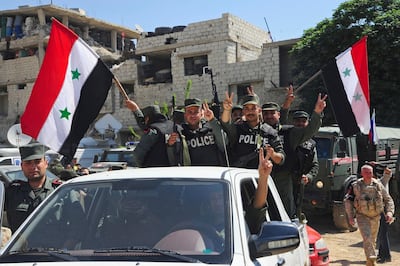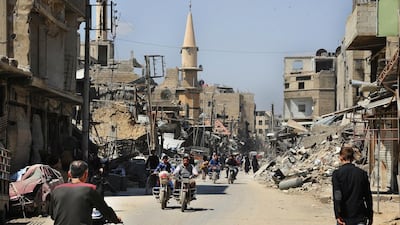International investigators on Sunday prepared to examine for the first time the site where dozens of civilians were killed in what the US and its allies say was a chemical weapons attack by the Syrian government.
The team from the Organisation for the Prohibition of Chemical Weapons arrived in Douma a day after the US, France and Britain launched missile strikes against Syrian chemical weapons facilities in response to the attack on April 7.
The morning strikes near Damascus and in Homs province were followed hours later by the Syrian government declaring it had full control of Douma, after the last rebels remaining in the town left with their families under an evacuation deal. On Sunday, the government sent 5,000 more soldiers into the town.
The OPCW inspectors met Syria's deputy foreign minister, Faisal Mekdad, for about three hours on Sunday in the presence of Russian officers and a senior Syrian security official, Reuters reported.
The investigators face a difficult task in Douma, the last town in the formerly rebel-held Eastern Ghouta suburbs of Damascus to fall in a government offensive launched in February. President Bashar Al Assad's government and its ally Russia deny there had been a chemical attack, and western powers claim they already had proof.
There is also the risk that evidence may have been removed from the site, which lies in an area of the town that has been controlled by Russian military police and Syrian forces for the past week.
"That possibility always has to be taken into account, and investigators will look for evidence that shows whether the incident site has been tampered with," said Ralf Trapp, a consultant and member of a previous OPCW mission to Syria.
_______________
Read more:
Ambassador Haley: US will stay in Syria until it secures goals
Air strikes fail to destroy ‘heart’ of Syrian weapons programme: defector
Limited strikes, limited goals and no strategy on Syria
_______________
Former residents of Douma who fled to northern Syria told The National on Sunday that there widespread looting in the area by the government's forces amid a chaotic evacuation process, despite the presence of Russian military personnel.
"After Assad's forces entered the area, they looted all houses, even the inhabited houses," said Humam Husari, a former Douma resident.
Mr Husari said residents who had remained in the area were unlikely to be reliable witnesses, fearing retaliation by the government for anything they might say.
“For those who decided to stay, they started raising Assad’s flag and pictures, and spoke to state media against the [rebel] factions, saying that they were oppressed by them,” he said.

The Eastern Ghouta region was the target of a chemical attack in 2013 that killed as many 1,400 people.
The then US president Barack Obama threatened to retaliate with military action against the Syrian government before Russia stepped in to broker a deal under which Mr Al Assad promised to destroy his chemical weapon stockpiles.
The OPCW monitored the process and declared the Syrian government no longer possessed chemical weapons in 2014, before contradicting that assertion when it confirmed sarin gas was used in the northern Syrian city of Khan Sheikhoun last April.
The US launched missiles at a Syrian airbase in response to that attack, and President Donald Trump warned after Saturday's strikes that the US was "locked and loaded" to respond if chemical weapons were used again.
British foreign minister Boris Johnson told the BBC on Sunday that western powers had no plans for further strikes but "if and when such a thing were to happen, then clearly with allies we would study what the options were".
The Jaish Al Islam rebel faction that held Douma, formerly one of the most powerful factions in Syria's seven-year civil war, had earlier rejected the government's evacuation offers but began withdrawing two days after the April 7 attack.
The Syrian Observatory for Human Rights, a Britain-based monitoring group, says 177,000 people have fled Eastern Ghouta since February, with 108,000 going to government-held areas. The rest, including about 12,000 rebel fighters, have moved to rebel-held Idlib province in north-west Syria.
_______________
Read more:
_______________

